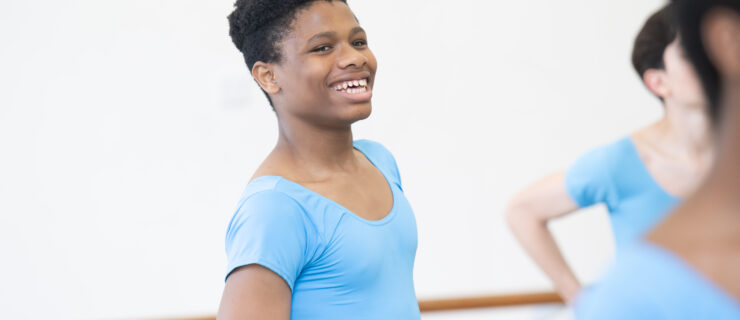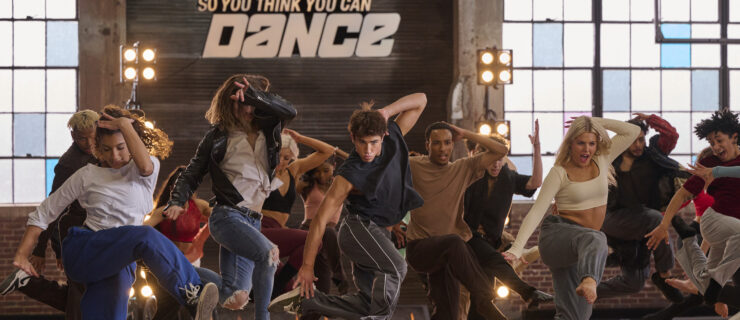Secret Agent
If you’re ready to take your first steps into the working world, chances are you’re wondering what the deal is with dance agents. Who needs one, what do they do, and perhaps most importantly, how can I land one? DS chatted with five agents from the country’s top dance agencies to bring you up to speed.
Who Needs an Agent?
Whether you’ll benefit from an agent once you start working professionally depends on the type of work you’re looking for. You don’t need an agent if you’re seeking a spot in a concert dance company (though some concert performers do have agents); however, if you want to do any kind of commercial work—music videos, music tours, commercials, TV, film, industrials—you can benefit from agency representation.
“Most of the legitimate and better-paying [commercial] jobs go through an agency to find dancers,” says Brianna Barcus of Clear Talent Group’s L.A. office. “While there are always little jobs here and there that non-represented dancers can find out about, they usually aren’t the resumé-building types of jobs, and tend to pay below standard rates.”
For landing commercial gigs, agency representation can be helpful no matter what your specialty. “There are so many different projects going on at any given time…that we need to keep our range of styles broad enough that we are able to cater to every project’s need,” says Chantelle Ameli of DDO Artists Agency. “We have jazz dancers, krumpers, ballroom dancers, ballerinas, tap dancers and hip-hop freestylers. We also have a large specialty-act category, including aerialists, acrobats, fire dancers and many other styles that are outside the norm.”
In NYC, agents can help dancers land commercial gigs and streamline the process of auditioning for Broadway. “If you don’t have an agent, [auditioning for theater shows] can mean standing in long lines and being at cattle calls all day,” says Jamie Harris of Clear Talent’s NYC branch. “As an agent I can get you into the invited calls. I can get you in front of casting directors in a room full of 50 people rather than 800 people.”
Duties of an Agent
-
Get you into auditions.
“Your agent should have a good knowledge of your talent as a dancer and use that knowledge whenever an opportunity comes across his or her desk to either submit you on a project or call you on a particular audition,” says Laney Filuk of Bloc agency. “Your agent uses the agency name and relationship to try and get you opportunities.” Though employers sometimes hold open auditions to cast dancers for jobs, most are closed, meaning you need an agent to grant you access.
-
Negotiate your pay and contract.
Keeping track of the business details of your dance career can be simple if you have a full-year contract with a company; however, commercial dancers often juggle dozens of shorter gigs a month. Once you book a job, your agent will handle the financial and legal aspects, like negotiating pay, making sure you’re paid on time and approving contracts. “[For music tours,] there are often 30- or 40-page contracts that dancers have to sign,” says Filuk. “Your agent is more than capable of looking over those contracts and trying to revise them if possible.” Your agent will make sure you’re paid fairly, including overtime or double-time pay when needed and extra money when it’s due—like if you’re using your own wardrobe for a job, or working on a music video that will also be sold on iTunes.
-
Ensure your safety.
Once you’re on the job, your agent will make sure everything goes smoothly and safely. “We look out for your best interest in every regard,” Ameli explains. Agents should make sure your employer has proper insurance coverage, floors suitable for dancing and an otherwise safe working environment. The goal: “You can do your job without the worry of being taken advantage of,” says Ameli.
Getting Signed
There are four main ways that agencies sign clients:
-
Referrals.
Any professional dancer or choreographer you meet could recommend you to his or her agency, and glowing recommendations from trusted clients is one way agencies sign new dancers.
-
Open auditions.
Major agencies hold two to four open auditions each year—advertised on agency websites and in major dance studios in L.A. and NYC.
-
Cold submissions.
“Dancers can submit themselves to the agency with a headshot, resumé and sample of their work,” such as a DVD of performance clips, says Ameli. “Even with this sort of submission, they will usually be asked to come to a live audition as well.” Keep in mind that your submission will be one of hundreds received in the mail each month, so include a cover letter with simple and straightforward bullet points outlining your training and major performance work.
-
Scouting.
Being in the right place at the right time has landed many professional dancers agency representation. “Agents attend dance concert events, showcases, competitions and classes, looking for the next great dancer,” says Barcus.
Making The Move
If you want to be a working dancer represented by an agent, you need to live in the city you’re working in. Auditions pop up at such short notice that out-of-towners aren’t able to keep up. “We’ve had some kids that say ‘It’s not a financial hardship, we can fly out to L.A. whenever you have an audition,’” says Terry Lindholm of McDonald Selznick Associates. “Inevitably, it works for a couple of months and then the parents call and say, it’s just not going to work out.” Most agents recommend that you don’t start working before age 18. Laws protecting minors—like limited work hours or school tutor requirements—make it difficult for teens under 18 to book jobs.
“You can learn the audition process without coming to NYC or Los Angeles,” says Lindholm. Though dance-specific agencies are mostly concentrated in NYC and L.A., you can find talent agencies in major cities around the country (see “All About L.A.?” below). To make sure you’re finding a legitimate agent, always consult a copy of the “Ross Reports,” which lists legitimate agencies in your area (rossreports.com).
Long story short, if you’re looking to dance in any commercial field, you will probably benefit from representation. So if you’re ready to start working, begin investigating talent agencies in your area. Good luck!
ALL ABOUT L.A.?
L.A. has long been known as the country’s nexus for commercial dancers, and it still provides the most commercial work. However, the commercial dance industries in NYC and other major cities are growing, and talent agencies are meeting this need with new agency outposts. MSA, Clear, Bloc and DDO all have offices in NYC; Bloc now has a South department that handles clients in Atlanta and Miami, while DDO has agencies in Las Vegas, Miami and Nashville.
Bloc’s Laney Filuk says that the music industry in Atlanta is rapidly developing, bringing opportunities for dancers to work with music artists and dance in music videos there. “Two of the hugest music artists right now, Ciara and Usher, they’re based out of Atlanta,” she says. Although Hollywood is the epicenter of the film industry, “a lot of commercials and feature films that shoot up in Toronto get cast out of Chicago or New York,” says Terry Lindholm of MSA, adding that Detroit, Orlando, Miami and major cities in North Carolina, Maryland and Texas are also promising sources of local commercial work.



